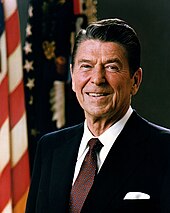Executive Order 12333
(i) Incidentally obtained information that may indicate involvement in activities that may violate federal, state, local or foreign laws[1]Part 2.11 of this executive order reiterates a proscription on US intelligence agencies sponsoring or carrying out an assassination.
It reads:[5] No person employed by or acting on behalf of the United States Government shall engage in, or conspire to engage in, assassination.Previously, EO 11905 (Gerald Ford) had banned political assassinations and EO 12036 (Jimmy Carter) had further banned indirect U.S. involvement in assassinations.
[8] Executive Order 12333 has been regarded by the American intelligence community as a fundamental document authorizing the expansion of data collection activities.
[9] The document has been employed by the National Security Agency as legal authorization for its collection of unencrypted information flowing through the data centers of internet communications giants Google and Yahoo!.
[9] In July 2014, former State Department official John Tye published an editorial in The Washington Post, citing his prior access to classified material on intelligence-gathering activities under Executive Order 12333, and arguing that the order represented a significant threat to Americans' privacy and civil liberties.
